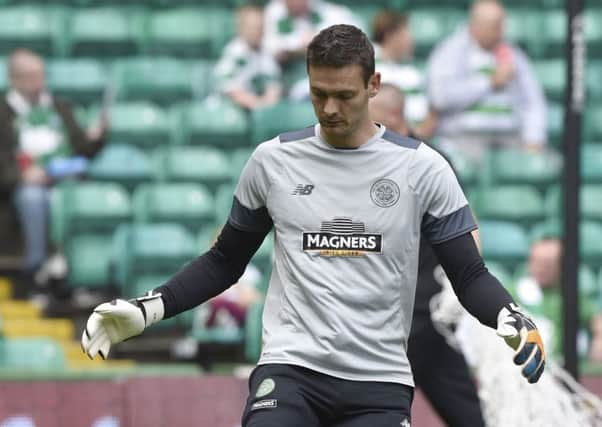Craig Gordon gets a kick out of his passing game at Celtic


He had been dropped by new Celtic manager Brendan Rodgers, who preferred his former Swansea City goalkeeper Dorus De Vries because he believed he was more comfortable with the ball at his feet.
It mirrored what had happened to Joe Hart at Manchester City under Pep Guardiola and for exactly the same reasons: both bosses demand that their goalkeepers cannot only maintain possession but also initiate moves.
Advertisement
Hide AdAdvertisement
Hide AdHit-and-hope hoofing the ball upfield became, like Gordon himself, obsolete overnight. Or so it seemed.
The 33-year-old was devastated after being replaced and considered leaving the champions. However, he elected to stay and fight for his place and, when De Vries sustained an injury against Kilmarnock in September, he seized the opportunity to re-establish himself with both feet.
Channelling his inner Zidane, Gordon has reinvented himself. From shotstopper to all-round footballer in one fell swoop, to the extent that he now occasionally plays outfield during training matches in order to improve his facility at receiving and recycling the ball.
As a consequence, he says that his job satisfaction is currently greater than at any point in his career.
“I’ve continued to improve on what I’ve been asked to do,” he said. “Everything has been going very well but I’m still looking to add to my game.”
Playing for a club such as Celtic, goalkeepers can often have very little to do but Gordon reveals that enhancing his distribution has increased his participation and his enjoyment.
“Now and again I’ll play outfield in training,” he said. “When we’re doing possession I might join in and, when we’re doing patterns of play, more often than not it starts from me.
“It’s up to me to be in the right positions to start us off. That’s something that I’ve had to learn. It’s OK saying you’re going to play out from the back but there needs to be a system and people in the right places to receive the ball.
Advertisement
Hide AdAdvertisement
Hide Ad“We’ve worked hard on that on the training field. When we’re shaping up the team, goalkeeping coach Stevie Woods is either beside me or behind the goal, helping the manager in terms of how we set up.
“It’s then up to me to execute the passes and the areas to exploit that I’ve been asked to.”
Just as strikers who have failed to score can be despondent even in victory, so Gordon could feel dissatisfied with a clean sheet if he hadn’t been called upon to display his reflexes. That, though, is also a thing of the past.
“I feel more involved in the games now because it’s a really important role,” he said. “Going back to the midweek game against Hamilton, it’s about trying to dictate the tempo and the speed of play.
“Whether that’s to quicken it up or slow it down depends on where the players are and the areas of the field we are looking to use.
“There’s a lot to think about. People will just look at me coming for crosses or shots saved but there’s a lot more to it than that, in terms of dictating the play. There’s also more satisfaction, my game is more complete and there are different attributes to be used.
“I didn’t make any saves of great note against Hamilton but came off feeling very good, having passed the ball around well and put it in the areas we wanted to go and create attacks.
“That’s part of my role now and it gives me great satisfaction, coming off with a clean sheet and having contributed to the team more in terms of passing the ball or keeping possession than with my actual goalkeeping work.
Advertisement
Hide AdAdvertisement
Hide Ad“Against Accies I didn’t have much goalkeeping work to do. Probably 90 per cent of my touches now are with my feet. When that happens I need to make sure my touch is right.”
Such is Rodgers’ determination that his goalkeeper should be part of his team (as opposed to an adjunct to it) that Gordon and his rivals in that position spend more time working on controlling and using the ball than they do on more traditional exercises for players in that position.
“Oh yeah; it’s so important to us and the way we play now,” he said. “Sometimes it’s more important than the other work – as long as I know that I’ll still be able to make the big saves when they’re required. Because that is still the most important part of my job.
“If I can add to that and look at the other side of the game and make sure I’m improving, then I’ll be happy.”
So have his team-mates started to refer to him as Pirlo yet?
“No, just on Twitter!” he grinned.